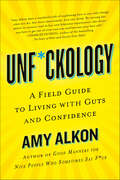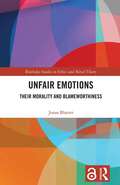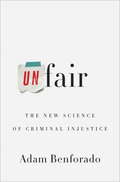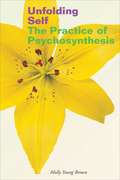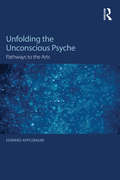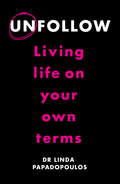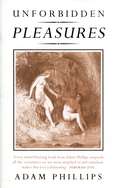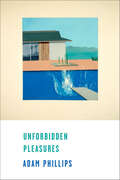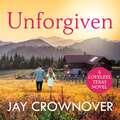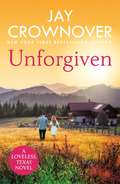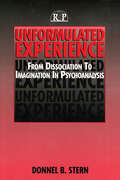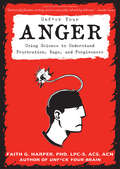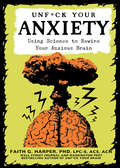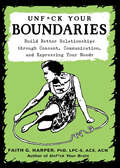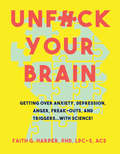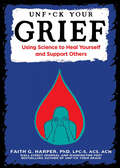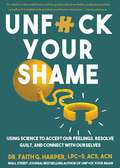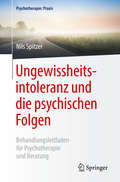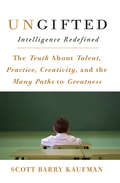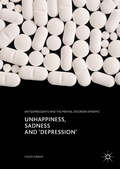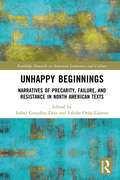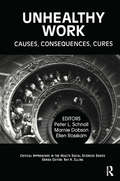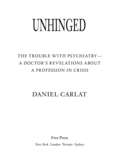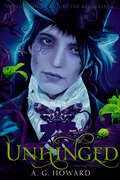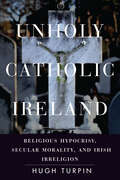- Table View
- List View
Unf*ckology: A Field Guide to Living with Guts and Confidence
by Amy AlkonAmy Alkon presents Unf*ckology, a “science-help” book that knocks the self-help genre on its unscientific ass. You can finally stop fear from being your boss and put an end to your lifelong social suckage. Have you spent your life shrinking from opportunities you were dying to seize but feel “that’s just who I am”? Well, screw that! You actually can change, and it doesn’t take exceptional intelligence or a therapist who’s looking forward to finally buying Aruba after decades of listening to you yammer on. Transforming yourself takes revolutionary science-help from Amy Alkon, who has spent the past 20 years translating cutting-edge behavioral science into highly practical advice in her award-winning syndicated column. In Unf*ckology, Alkon pulls together findings from neuroscience, behavioral science, evolutionary psychology, and clinical psychology. She explains everything in language you won’t need a psych prof on speed-dial to understand—and with the biting dark humor that made Good Manners for Nice People Who Sometimes Say F*ck such a great read. She debunks widely-accepted but scientifically unsupported notions about self-esteem, shame, willpower, and more and demonstrates that: - Thinking your way into changing (as so many therapists and self-help books advise) is the most inefficient way to go about it. - The mind is bigger than the brain, meaning that your body and your behavior are your gym for turning yourself into the new, confident you. - Fear is not just the problem; it’s also the solution.- By targeting your fears with behavior, you make changes in your brain that reshape your habitual ways of behaving and the emotions that go with them.Follow Amy Alkon's groundbreaking advice in Unf*ckology, and eventually, you’ll no longer need to act like the new you; you’ll become the new you. And how totally f*cking cool is that?
Unfair Emotions: Their Morality and Blameworthiness (Routledge Studies in Ethics and Moral Theory)
by Jonas BlatterThis book provides a novel philosophical account of the unfairness of certain emotions. It explains how the concept of unfairness can be applied to emotions and how emotions can be the proper objects of second-person moral evaluation.Emotions are an integral part of our moral practices. While the links between emotions and morality have received much philosophical attention recently, the phenomenon of unfair emotions remains under-explored. This book examines an everyday phenomenon that we often perceive other people’s emotions as unfair, in a similar way as if they acted unfairly. It argues that the notion of unfairness combines elements of the unfittingness and of the moral relevance of an emotion. In the first half of the book, the author shows how an unfair emotion can wrong another person. His account holds that an emotion is unfair to its target if its inherent action tendencies constitute a directed moral hazard to the targeted person. In the second half, the author examines to what extent we are responsible for feeling an unfair emotion, and in what way we can – and cannot – be held accountable for it. He argues not only that emotions can be unfair but also that there are limits to when we may hold people accountable for them.Unfair Emotions will appeal to scholars and graduate students working in ethics, philosophy of emotion, moral psychology, and cognitive psychology.
Unfair: The New Science of Criminal Injustice
by Adam Benforado"A law professor sounds an explosive alarm on the hidden unfairness of our legal system." --Kirkus Reviews, starred A child is gunned down by a police officer; an investigator ignores critical clues in a case; an innocent man confesses to a crime he did not commit; a jury acquits a killer. The evidence is all around us: Our system of justice is fundamentally broken. But it's not for the reasons we tend to think, as law professor Adam Benforado argues in this eye-opening, galvanizing book. Even if the system operated exactly as it was designed to, we would still end up with wrongful convictions, trampled rights, and unequal treatment. This is because the roots of injustice lie not inside the dark hearts of racist police officers or dishonest prosecutors, but within the minds of each and every one of us. This is difficult to accept. Our nation is founded on the idea that the law is impartial, that legal cases are won or lost on the basis of evidence, careful reasoning and nuanced argument. But they may, in fact, turn on the camera angle of a defendant's taped confession, the number of photos in a mug shot book, or a simple word choice during a cross-examination. In Unfair, Benforado shines a light on this troubling new field of research, showing, for example, that people with certain facial features receive longer sentences and that judges are far more likely to grant parole first thing in the morning. Over the last two decades, psychologists and neuroscientists have uncovered many cognitive forces that operate beyond our conscious awareness. Until we address these hidden biases head-on, Benforado argues, the social inequality we see now will only widen, as powerful players and institutions find ways to exploit the weaknesses of our legal system. Weaving together historical examples, scientific studies, and compelling court cases--from the border collie put on trial in Kentucky to the five teenagers who falsely confessed in the Central Park Jogger case--Benforado shows how our judicial processes fail to uphold our values and protect society's weakest members. With clarity and passion, he lays out the scope of the legal system's dysfunction and proposes a wealth of practical reforms that could prevent injustice and help us achieve true fairness and equality before the law.From the Hardcover edition.
Unfolding Self: The Practice of Psychosynthesis
by Molly Young BrownThis classic text on psychosynthesis counseling and psychotherapy is for individuals who want to challenge their clients and students to more fully use their creative and healing powers. Key concepts covered include essential being and motivation of the individual; Assagioli's psychological laws; the psychosynthesis model of human growth; and specific problems that psychosynthesis addresses in the various stages of the human development. This book helps guide individuals toward greater health, creativity, and fulfillment.
Unfolding the Unconscious Psyche: Pathways to the Arts
by Edward ApplebaumUnfolding the Unconscious Psyche is a study of the creative arts and depth psychology, and the threads that run between the two. Edward Applebaum begins with works of art, in media including painting, music, literature and film, and pursues aspects of each towards an understanding of the unconscious psyche of the creator. By combining a study of the artistic work with the insight of depth psychology, Applebaum opens a dialogue between studies of works of art and their creators and the individuals who form the work’s audience. Each discussion is dictated by the artwork itself and is viewed from a variety of perspectives. Throughout the book the reader is encouraged to develop their own analytical technique: to follow the clues available, link threads together and analyse what they can see. The result demonstrates the value of dialogue in blending depth psychology with the arts, through examination of work by artists including Georgia O’Keefe, Ingmar Bergman, Frida Kahlo, Gustav Mahler and Virginia Woolf. Applebaum also seeks to correct misconceptions about the arts that have filtered into the study and practice of depth psychology since the earliest writings of Freud and Jung. This uniquely creative and insightful work will be absorbing reading for analytical and depth psychologists, students of analytical psychology, academics and scholars of the arts and anyone with an interest in the application of Jungian ideas.
Unfollow: Living Life on Your Own Terms
by Dr Linda PapadopoulosLife is full of opportunity for young women, but it's also far more pressured than ever before. Whether it's the proliferation or the homogeneity of images of beauty and success that wallpaper our world, we know what a beautiful woman looks like - and we know what a perfect life looks like too. We live in a world that floods us with expectations about everything - from what we should weigh to what we should wear to how often we should be having sex and how much money we should be making. As a consequence, we begin to feel that we need to tick all these boxes in order to have 'the Perfect Life'. When we inevitably fall short, we feel anxious - we feel that we are failing and have the sense we are losing control. As a result, increasing numbers of young women are battling with issues such as anxiety, low self-esteem, bullying, perfectionism, toxic friendships and relationships, pressure to succeed or conform, and poor body image. At an age when life should be exciting, fun and relatively care-free, more and more young women are adrift and struggling. Dr Linda Papadopoulos understands the issues and has the experience to guide and support young women to help get their lives back on track so they can feel happier, more confident, more in control. Unfollow: Living life on your own terms offers valuable insight and practical self-help to empower women to throw off the burden of expectation and start leading the lives they want to lead.
Unforbidden Pleasures
by Adam PhillipsForbidden pleasures, he argues, are the ones we tend to think about, yet when you look into it, it is probable that we get as much pleasure, if not more, from unforbidden pleasures than from those that are taboo. And we may have underestimated just how restricted our restrictiveness, in thrall to the forbidden and its rules, may make us. An ambitious book that speaks to the precariousness of modern life, Unforbidden Pleasures explores the philosophical, psychological, and social dynamics that govern human desire and shape our everyday reality.
Unforbidden Pleasures
by Adam PhillipsMuch has been written of the forbidden pleasures. But what of the "unforbidden" pleasures?Unforbidden Pleasures is the singular new book from Adam Phillips, the author of Missing Out, Going Sane, and On Balance. Here, with his signature insight and erudition, Phillips takes Oscar Wilde as a springboard for a deep dive into the meanings and importance of the unforbidden, from the fall of our "first parents," Adam and Eve, to the work of the great psychoanalytic thinkers. Forbidden pleasures, he argues, are the ones we tend to think about, yet when you look into it, it is probable that we get as much pleasure, if not more, from unforbidden pleasures than from those that are taboo. And we may have underestimated just how restricted our restrictiveness, in thrall to the forbidden and its rules, may make us. An ambitious book that speaks to the precariousness of modern life, Unforbidden Pleasures explores the philosophical, psychological, and social dynamics that govern human desire and shape our everyday reality.
Unforgiven: A steamy Texan romance with ‘heart-pounding suspense' that will hook you right from the start! (Loveless)
by Jay CrownoverFrom the New York Times bestselling author of the Marked Men series comes an irresistible and suspenseful romance between a tough Texas Ranger and his first love - a woman in danger who insists she doesn't need his protection.Hill Gamble is a model lawman: cool and collected, with a confident swagger to boot. Too bad all that Texas charm hasn't gotten him anywhere in his personal life, especially since the only girl he ever loved has always been off-limits. But then Hill is assigned to investigate her father's mysterious death, and he's forced back to the town - and the woman - he left behind.When Hill left Loveless, he broke Kody Lawton's already battered heart. And now that he's working on her father's case, avoiding him is impossible. She can handle Hill and her unwanted feelings - until he puts his life on the line to protect her. Suddenly, Kody realizes that Hill could be taken away from her...for good.(P)2020 Hachette Audio
Unforgiven: A steamy Texan romance with ‘heart-pounding suspense’ that will hook you right from the start! (Loveless #2)
by Jay Crownover'Crownover writes cowboys that make you want to pack your bags in search of a small-town ranch! Alpha and broody, they hit all the right buttons' Melissa Foster, New York Times bestselling authorFrom the New York Times bestselling author of the Marked Men series comes Jay Crownover's latest steamy romance. Can Hill and Kody find their way back to each other, or will they be torn apart for good.... 'Crownover delivers the goods' Lori Wilde, New York Times bestselling authorHill Gamble is a model lawman: cool and collected, with a confident swagger to boot. Too bad all that Texas charm hasn't gotten him anywhere in his personal life, especially since the only girl he ever loved has always been off-limits. But then Hill is assigned to investigate her father's mysterious death, and he's forced back to the town - and the woman - he left behind. When Hill left Loveless, he broke Kody Lawton's already battered heart. And now that he's working on her father's case, avoiding him is impossible. Kody can handle Hill and her unwanted feelings - until he puts his life on the line to protect her. Suddenly, Kody realizes that Hill could be taken away from her...for good.An suspense-filled, irresistible romance between a rugged Texas Ranger and his stubborn first love.Includes the bonus novella Cowboy to the Rescue by A.J. Pine!Readers are loving Jay Crownover's latest!'This is a humdinger of a read. With over-the-top, non-stop action, it's a page turner you simply can't put down' 5* reader review'Thick with emotion, smoulderingly sexy with a heart-pounding suspense story that kept me glued to my Kindle, Unforgiven was quintessential Jay Crownover, but with a fresh twist' 5* reader review'There's plenty of action and danger as the murder investigation moves along. And there's plenty of heat to entertain readers too!' Harlequin Junkie Filled with heart, intrigue and cast of characters you'll fall for, don't miss out on the other titles in the Loveless, Texas series! Praise for Jay Crownover and the Loveless, Texas series:'I'm in love with Loveless, TX!!' 5* reader review'I always recommend any books written by Jay Crownover' 5* reader review'I've never read a Jay Crownover book that I have not loved' 5* reader review'Off the charts attraction, dramatic suspense, heartbreaking betrayal, deep emotion, and unforgettable romance will keep you turning the pages to the climactic end. Fans and new readers will devour this fantastic story. I couldn't put it down!' Jennifer Ryan, New York Times bestselling author'Once again, Jay Crownover proves why her words are so addictive! Her characters bleed life so tangibly, you feel like you're drowning in the emotions: in the best way possible. Five big huge stars for Justified! Don't miss this page turner!' Harper Sloan, New York Times bestselling author
Unformulated Experience: From Dissociation to Imagination in Psychoanalysis (Relational Perspectives Book Series #8)
by Donnel B. SternIn this powerful and wonderfully accessible meditation on psychoanalysis, hermeneutics, and social constructivism, Donnel Stern explores the relationship between two fundamental kinds of experience: explicit verbal reflection and "unformulated experience," or experience we have not yet reflected on and put into words. Stern is especially concerned with the process by which we come to formulate the unformulated. It is not an instrumental task, he holds, but one that requires openness and curiosity; the result of the process is not accuracy alone, but experience that is deeply felt and fully imagined. Stern's sense of explicit verbal experience as continuously constructed and emergent leads to a central dialectic at the heart of his work: that between curiosity and imagination, on one hand, and dissociation and unthinking acceptance of the familiar on the other. The goal of psychoanalytic work, he holds, is the freedom to be curious, whereas defense signifies the denial of this freedom. We defend against our fear of what we would think, that is, if we allowed ourselves the freedom to think it.Stern also shows how the unconscious itself can be reconceptualized hermeneutically, and he goes on to explore the implications of this viewpoint on interpretation and countertransference. He is especially persuasive in showing how the interpersonal field, which is continuously in flux, limits the experience that it is possible for participants to reflect on. Thus it is that analyst and patient are together "caught in the grip of the field," often unable to see the kind of relatedness in which they are mutually involved.A brilliant demonstration of the clinical consequentiality of hermeneutic thinking, Unformulated Experience bears out Stern's belief that psychoanalysis is as much about the revelation of the new in experience as it is about the discovery of the old
Unfuck Your Anger: Using Science to Understand Frustration, Rage, and Forgiveness
by Faith G. Harper, PhD, LPC-S, ACS, ACNIf you've ever been so pissed off that you did things that you regretted, or ruined your own day and some other people's too, this book is for you. Or if you feel angry every single day and it's affecting your health and sleep and love of life. Or if you've got very good reasons to be mad as hell, and you aren't going to take it anymore. Or if you've repressed your anger all your life and now it's all coming out at once. Microcosm Publishing bestseller Dr Faith explains here what the hell is going on in your brain and how to retrain yourself to deal with enraging situations more productively and without torpedoing your relationships. This is Your Brain on Anger gives you a heady dose of neuroscience and cultural explanation of what anger is and what it does to you, and then gives you a handy four-step checklist to help you deal with maddening situations after (or before) the fact, guidance on getting over things, and a chapter on forgiveness. Your brain actually knows what it's doing, and anger can be a good thing sometimes—just not if it's ruining your life.
Unfuck Your Anxiety: Using Science to Rewire Your Anxious Brain (5-Minute Therapy)
by Faith G. Harper, PhD, LPC-S, ACS, ACNAnxiety is a survival skill gone haywire. It happens when our brain is working so hard to protect us that it forgets to notice that the danger has passed. It feels like choking, stifling, smothering, tingling, panicking our brains cut out and we start to make bad decisions all normal anxiety reactions. Dr. Faith G. Harper, author of the bestselling Unfuck Your Brain and This is Your Brain on Depression packs a ton of knowledge and help into this practical manual. She helps us understand the history and science of anxiety, realize when it's become a serious problem, know the difference between anxiety and other conditions, and cope with it in the moment as well as addressing it long term. This book is a lifesaver for panic attacks, breaking out of flight-fight-freeze responses, similar and co-occurring conditions, and for chronic anxiety. Straightforward, funny, kind, and judgment free, it includes a wide range of tips, exercises, and medical interventions. It's also good for people who aren't burdened by daily anxiety but want to cope better with the tough life situations we all face. Read this book and breathe!
Unfuck Your Boundaries: Build Better Relationships through Consent, Communication, and Expressing Your Needs (5-minute Therapy Ser.)
by Faith G. Harper, PhD, LPC-S, ACS, ACNBoundaries are the ways we communicate our needs. They are what allow us to feel safe among strangers, in everyday interactions, and in our closest relationships. When we have healthy boundaries, we have a strong foundation in an uncertain world. And when someone crosses your boundaries, or you cross someone else's, the results range from unsettling to catastrophic. In this book, bestselling author Dr. Faith Harper offers a full understanding of issues of boundaries and consent, how we can communicate and listen more effectively, and how to survive and move on from situations where our boundaries are violated. Along the way, you'll learn when and how to effectively say "no" (and "yes"), troubleshoot conflict, recognize abuse, and respect your own and others' boundaries like a pro. You'll be amazed at how much these skills improve your relationships with friends, strangers, coworkers, and loved ones.
Unfuck Your Brain: Using Science to Get Over Anxiety, Depression, Anger, Freak-outs, and Triggers (Five Minute Therapy #1)
by Faith G. Harper, PhD, LPC-S, ACS, ACNOur brains are doing our best to help us out, but they can be real assholes sometimes. Sometimes it seems like your own brain is out to get you—melting down in the middle of the grocery store, picking fights with your date, getting you addicted to something, or shutting down completely at the worst possible moments. You already told your brain firmly that it isn't good to do these things. But your brain has a mind of its own. That's where this book comes in. With humor, patience, and lots of swearing, Dr. Faith shows you the science behind what's going on in your skull and talks you through the process of retraining your brain to respond appropriately to the non-emergencies of everyday life. If you're working to deal with old traumas, or if you just want to have a more measured and chill response to situations you face all the time, this book can help you put the pieces of the puzzle together and get your life and brain back.Here's an excerpt from the book:Knowing what&’s going on up in your brain is HUGE. So much of how we interact with the world around us is a completely normal response when we take into account our past experiences and how our brains work. • Freaking the fuck out • Avoiding important shit we need to take care of • Feeling pissed off all the time • Being a dick to people we care about • Putting shit in our bodies that we know isn&’t good for us • Doing shit we know is dumb or pointlessNone of these things are fucking helpful. But they all make sense.Your brain has adapted to the circumstances in your life and started doing things to protect you, bless it. It&’s not TRYING to fuck you over (even though it totally is, at times).As we navigate the world, nasty shit happens. The brain stores info about the nasty shit to try to avoid it in the future. Sometimes these responses are helpful. Sometimes the responses become a bigger problem than the actual problem was. It&’s called a trauma reaction.And even if you aren&’t dealing with a specific trauma? Adaptive coping strategies, bad habits, and funky behaviors all wire in similar ways. And research is showing that these issues are actually some of the easier ones to treat in therapy … if we address what&’s really going on, rather than just the symptoms.
Unfuck Your Grief: Using Science to Heal Yourself and Support Others
by Dr Faith G. HarperWhen we lose someone or something close to us—a loved person or animal, a relationship, our health, our dream, our idea of who we are—it hurts. A lot. Grief is both what we experience and how we heal. Dr. Faith Harper, bestselling author of books like Unfuck Your Brain and Unfuck Your Boundaries brings us a counseling and neuroscience perspective on grieving. She explains what is actually happening in our brains and bodies and what we need in order to allow it to happen fully. She also shows us how to identify and treat traumatic grief, the variety of grieving processes we experience, what grief looks like in the long term, when to get professional support, and how to ask the people in our lives for what we need (and to give ourselves the care we need as well). You'll also find solid advice on how (and how not!) to support a grieving person in your life. Wise, a little crass, and gently funny.
Unfuck Your Shame: Using Science to Accept Our Feelings, Resolve Guilt, and Connect with Ourselves
by Dr Faith G. HarperShame and guilt are perhaps the most difficult emotions humans experience. They tell us we are fundamentally broken, wrong, and unsalvageable—and then we operate in the world from that self-concept. Dr. Faith G. Harper, bestselling author of Unfuck Your Brain and Unfuck Your Stress, writes that these emotions often result from our sense of "not-enough-ness" and the overwhelming feeling that we need to hide parts of ourselves in order to be loved and accepted. But we don't need to keep going through life feeling guilty, ashamed, and disconnected from ourselves. With compassion, humor, brain science, and swearing, she guides us through the difficult shadow work of finding and reconnecting with these hidden parts and learning to accept our whole selves to regain our sense of vitality and completeness. Because we each deserve the experience of being a fully alive human.
Ungewissheitsintoleranz und die psychischen Folgen: Behandlungsleitfaden für Psychotherapie und Beratung (Psychotherapie: Praxis)
by Nils SpitzerDieses Buch führt Psychotherapeuten und Berater in relevante Facetten von Ungewissheitsintoleranz ein, verdeutlicht ihre transdiagnostische Rolle bei psychischen Störungen und stellt detailliert therapeutische Ansatzpunkte zu ihrer Veränderung vor. Der Autor zeigt, wie Therapeuten, Berater und Psychiater ihre Patienten und Klienten dabei unterstützen können, Ungewissheit besser auszuhalten. Denn ausgeprägte Ungewissheitstoleranz ist möglicherweise eine Schlüsselkompetenz in unserer Zeit beständigen Wandels und steigender Unsicherheit.Die psychotherapeutische Forschung beschäftigt sich unter dem Begriff Intoleranz gegenüber Ungewissheit/Intolerance of Uncertainty (IU) mit den negativen Folgen für Menschen, die Ungewissheit nur in kleiner Dosis ertragen können. Die Liste der psychischen Diagnosen, mit denen IU in Zusammenhang gebracht wird, ist lang: Generalisierte Angststörung, Zwangsstörung, Soziale Phobie, andere Angststörungen, Autismus, Depression und der ungewisse Verlauf chronischer Krankheiten. Aus dem Inhalt: Ungewissheit – Geringe Toleranz gegenüber dem Ungewissen – Mögliche Ursachen – Psychische Folgen – Therapieziele – Therapeutische Beziehung – Exploration – Interventionen – Ideen zu einem alternativen Sinn für das Ungewisse. Der Autor: Nils Spitzer ist Psychologischer Psychotherapeut in freier Praxis, Dozent, Autor zahlreicher Artikel und mehrerer Fachbücher sowie Mitherausgeber der Zeitschrift für Rational-Emotive & Kognitive Verhaltenstherapie.
Ungifted: Intelligence Redefined
by Scott Barry KaufmanChild prodigies. Gifted and Talented Programs. Perfect 2400s on the SAT. Sometimes it feels like the world is conspiring to make the rest of us feel inadequate. Those children tapped as possessing special abilities will go on to achieve great things, while the rest of us have little chance of realizing our dreams. Right?In Ungifted, cognitive psychologist Scott Barry Kaufman-who was relegated to special education as a child-sets out to show that the way we interpret traditional metrics of intelligence is misguided. Kaufman explores the latest research in genetics and neuroscience, as well as evolutionary, developmental, social, positive, and cognitive psychology, to challenge the conventional wisdom about the childhood predictors of adult success. He reveals that there are many paths to greatness, and argues for a more holistic approach to achievement that takes into account each young person's personal goals, individual psychology, and developmental trajectory. In so doing, he increases our appreciation for the intelligence and diverse strengths of prodigies, savants, and late bloomers, as well as those with dyslexia, autism, schizophrenia, and ADHD.Combining original research, anecdotes, and a singular compassion, Ungifted proves that anyone-even those without readily observable gifts at any single moment in time-can become great.
Unhappiness, Sadness and 'Depression'
by Tullio GiraldiThis book examines existing treatments, legislation and research methodology of depression and exposes their limitations, championing psycho-social support as an alternative. Depression, affecting 350 million people according to the World Health Organisation, is almost invariably diagnosed by the criteria of the American Psychiatric Association - a definition which encompasses those with normal emotional responses to stressful life events. Tullio Giraldi discusses recent developments in popular and academic dialogue related to the use of antidepressants and recent increases in depression diagnosis and laments the rise in prescribing antidepressants despite their links to suicide and unfulfilled promises of efficacy and safety. He argues that psychotherapy is a cost effective treatment devoid of drugs' adverse effects. This work presents psycho-social support as an alternative to antidepressants, particularly for less severe cases, and as a more effective strategy for coping with the emotional challenges of today's global reality. Patients, students of medicine and psychology, and professionals of mental health will find this work valuable.
Unhappy Beginnings: Narratives of Precarity, Failure, and Resistance in North American Texts (Routledge Research in American Literature and Culture)
by Isabel González-Díaz Fabián Orán-LlarenaThis book offers the analysis of a selection of North American texts that dismantle and resist normative frames through the resignification of concepts such as unhappiness, precarity, failure, and vulnerability. The chapters bring to the fore how those potentially negative elements can be refigured as ambivalent sites of resistance and social bonding. Following Sara Ahmed’s rereading of happiness, other authors such as Judith Butler, Wendy Brown, Jack Halberstam, Lauren Berlant, or Henry Giroux are mobilized to interrogate films, memoirs, and novels that deal with precarity, alienation, and inequality. The monograph contributes to enlarging the archives of unhappiness by changing the focus from prescribed norms and happy endings to unruly practices and unhappy beginnings. As the different contributors show, unhappiness, precarity, vulnerability, or failure can be harnessed to illuminate ways of navigating the world and framing society that do not necessarily conform to the script of happiness—whatever that means.
Unhealthy Work: Causes, Consequences, Cures (Critical Approaches in the Health Social Sciences Series)
by Ellen Rosskam Peter L. Schnall Marnie Dobson Ray H. EllingWork, so fundamental to well-being, has its darker and more costly side. Work can adversely affect our health, well beyond the usual counts of injuries that we think of as 'occupational health'. The ways in which work is organized - its pace and intensity, degree of control over the work process, sense of justice, and employment security, among other things - can be as toxic to the health of workers as the chemicals in the air. These work characteristics can be detrimental not only to mental well-being but to physical health. Scientists refer to these features of work as 'hazards' of the 'psychosocial' work environment. One key pathway from the work environment to illness is through the mechanism of stress; thus we speak of 'stressors' in the work environment, or 'work stress'. This is in contrast to the popular psychological understandings of 'stress', which locate many of the problems with the individual rather than the environment. In this book we advance a social environmental understanding of the workplace and health. The book addresses this topic in three parts: the important changes taking place in the world of work in the context of the global economy (Part I); scientific findings on the effects of particular forms of work organization and work stressors on employees' health, 'unhealthy work' as a major public health problem, and estimates of costs to employers and society (Part II); and, case studies and various approaches to improve working conditions, prevent disease, and improve health (Part III).
Unhinged: A Doctor's Revelations About a Profession in Crisis
by Daniel CarlatIn this stirring and beautifully written wake-up call, psychiatrist Daniel Carlat exposes deeply disturbing problems plaguing his profession, revealing the ways it has abandoned its essential purpose: to understand the mind, so that psychiatrists can heal mental illness and not just treat symptoms. As he did in his hard-hitting and widely read New York Times Magazine article "Dr. Drug Rep," and as he continues to do in his popular watchdog newsletter, The Carlat Psychiatry Report, he writes with bracing honesty about how psychiatry has so largely forsaken the practice of talk therapy for the seductive and more lucrative practice of simply prescribing drugs, with a host of deeply troubling consequences. Psychiatrists have settled for treating symptoms rather than causes, embracing the apparent medical rigor of DSM diagnoses and prescription in place of learning the more challenging craft of therapeutic counseling, gaining only limited understanding of their patients lives. Talk therapy takes time, whereas the fifteen-minute "med check" allows for more patients and more insurance company reimbursement. Yet DSM diagnoses, he shows, are premised on a good deal less science than we would think. Writing from an insider's perspective, with refreshing forthrightness about his own daily struggles as a practitioner, Dr. Carlat shares a wealth of stories from his own practice and those of others that demonstrate the glaring shortcomings of the standard fifteen-minute patient visit. He also reveals the dangers of rampant diagnoses of bipolar disorder, ADHD, and other "popular" psychiatric disorders, and exposes the risks of the cocktails of medications so many patients are put on. Especially disturbing are the terrible consequences of over-prescription of drugs to children of ever younger ages. Taking us on a tour of the world of pharmaceutical marketing, he also reveals the inner workings of collusion between psychiatrists and drug companies. Concluding with a road map for exactly how the profession should be reformed, Unhinged is vital reading for all those in treatment or considering it, as well as a stirring call to action for the large community of psychiatrists themselves. As physicians and drug companies continue to work together in disquieting and harmful ways, and as diagnoses and misdiagnoses of mental disorders skyrocket, it's essential that Dr. Carlat's bold call for reform is heeded.
Unhinged: A Splintered Novel (Splintered Series #Bk. 2)
by A. G. HowardWonderland causes real-world trouble for a teenage descendant of Alice in this romantic, dark fantasy sequel by the bestselling author of Splintered.Alyssa Gardner has been down the rabbit hole. She was crowned Queen of the Red Court and faced the bandersnatch. She saved the life of Jeb, the boy she loves, and escaped the machinations of the disturbingly appealing Morpheus. Now all she has to do is graduate high school.That would be easier without her mother, freshly released from an asylum, acting overly protective and suspicious. And it would be much simpler if the mysterious Morpheus didn’t show up for school one day to tempt her with another dangerous quest in the dark, challenging Wonderland—where she (partly) belongs.Could she leave Jeb and her parents behind again, for the sake of a man she knows has manipulated her before? Will her mother and Jeb trust her to do what’s right? Readers will swoon over the satisfying return to Howard’s bold, sensual reimagining of Carroll’s classic.“I really enjoyed the first book of this series, but Unhinged cranks the Wonderland experience up to 11. It’s just . . . WOW! The last few scenes dangle Alyssa’s next adventure with shockers enough that I found my jaw needing a bit of assistance in coming off the floor. Write quickly, A. G. Howard! I need that next book!”—USA Today“Howard excels in sensory and sensuous descriptions.” —Kirkus Reviews “As intense, dark, and weird as the first volume, this worthy sequel creates a parallel narrative that brings the action out of Wonderland and into Alyssa’s hometown.” —The Bulletin of The Center for Children’s Books“A dark beauty fills the novel's pages, which will mesmerize teens with a taste for magic, romance or suspense. Unhinged lays the groundwork for a third book where anything could happen—it is Wonderland, after all.” —Shelf Awareness
Unholy Catholic Ireland: Religious Hypocrisy, Secular Morality, and Irish Irreligion (Spiritual Phenomena)
by Hugh TurpinThere are few instances of a contemporary Western European society more firmly welded to religion than Ireland is to Catholicism. For much of the twentieth century, to be considered a good Irish citizen was to be seen as a good and observant Catholic. Today, the opposite may increasingly be the case. The Irish Catholic Church, once a spiritual institution beyond question, is not only losing influence and relevance; in the eyes of many, it has become something utterly desacralized. In this book, Hugh Turpin offers an innovative and in-depth account of the nature and emergence of "ex-Catholicism"—a new model of the good, and secular, Irish person that is being rapidly adopted in Irish society. Using rich quantitative and qualitative research methods, Turpin explains the emergence and character of religious rejection in the Republic. He examines how numerous factors—including economic growth, social liberalization, attenuated domestic religious socialization, the institutional scandals and moral collapse of the Church, and the Church's lingering influence in social institutions and laws—have interacted to produce a rapid growth in ex-Catholicism. By tracing the frictions within and between practicing Catholics, cultural Catholics, and ex-Catholics in a period of profound cultural change and moral reckoning, Turpin shows how deeply the meanings of being religious or non-religious have changed in the country once described as "Holy Catholic Ireland."
